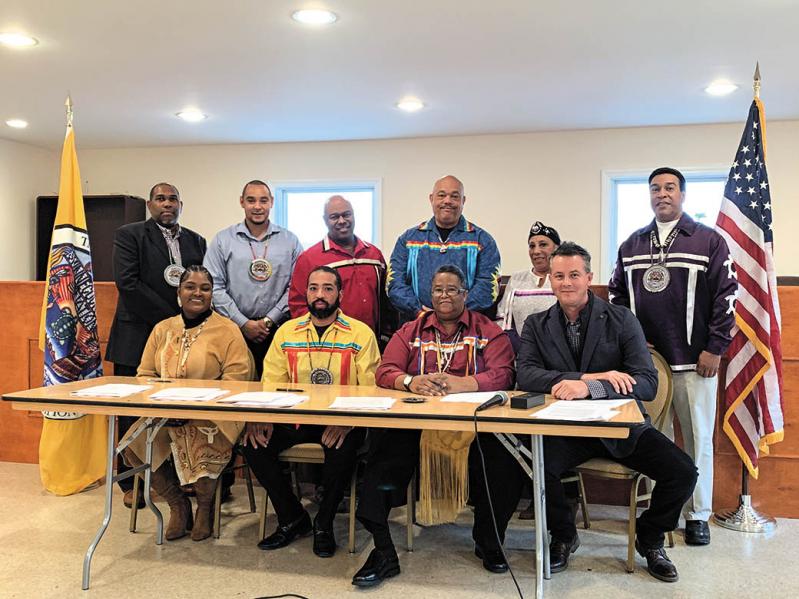The Shinnecock Indian Nation has big plans for 2020. On the heels of the controversial construction of electronic billboards on Sunrise Highway last summer, the Shinnecock Council of Trustees is in the early stages of planning a gas station and a medical marijuana dispensary, both part of a multifaceted approach to broaden the tribe’s income to support much-needed programs for its 1,600 members, according to Bryan Polite, the council’s chairman.
With 620 tribal members living on the reservation, plus 180 tribal spouses, the Nation has struggled with ways to find revenue for much-needed services, Mr. Polite said. Sixty percent of the nation is living below the poverty level, many in dilapidated, 1920s-era houses, he said. Bank loans are near impossible to get because the bank cannot take tribal land if the borrower defaults, so many people turn to high-interest credit cards to build a house, he added.
Feasibility studies are underway for gas stations on Shinnecock land either or both at Westwoods, a 79-acre parcel including land that runs along Sunrise Highway in Hampton Bays, where the billboard is erected, or near the shops on Montauk Highway in Shinnecock Hills. The plan is for the station to act as a mini rest stop at the gateway to the South Fork, Mr. Polite said. “The station would go a long way to alleviate some of the financial concerns of the local community.”
The council formed a company called Eastern Wood Petroleum to begin looking into the gas stations. Once the feasibility study is complete, which should be soon, the council will sit down with Southampton Town officials, who so far have been amenable to the idea. Mr. Polite said the council wants to ensure the project “benefits not only the Shinnecocks but the East End community.”
It would offer more affordable gasoline, through existing treaties, just as cigarettes are sold through free trade on Native American reservations. There will be a tribal tax, not nearly as high as the state tax, and revenue would go into education and affordable housing programs to help Shinnecock Nation members. The Shinnecock-owned gas station would differ from the gas stations on the Unkechaug Nation’s Poospatuck Reservation in Mastic, which are owned by individuals. While Mr. Polite admits it may be an ambitious goal, he is hopeful the station could be up and running by the summer of 2020.
In late November, the tribal council announced plans for a medical marijuana dispensary and holistic wellness center on land near the existing smoke shops along Montauk Highway, near the Stony Brook Southampton campus.
Council members signed an agreement with Conor Green Consulting to build and operate the facility in a soon-to-be-constructed 3,600-square-foot building near Native Sons and Carla’s Kitchen. Clearing has already begun on the site. They are working with the State Department of Health on a license. Mr. Polite met with state officials, including Attorney General Letitia James, to discuss the initiative.
Three years ago, the tribe voted in favor of the move following passage of the state’s Compassionate Care Act, which allows certified health-care providers to recommend the medical use of marijuana for patients being treated for certain conditions, such as cancer, chronic pain, seizures, or severe nausea. The nation passed an ordinance a few years ago that mirrors the Compassionate Care Act, Mr. Polite said, and it formed a five-person regulatory division. A medical marijuana cultivation operation is possible in the future as well.
On the 800-acre reservation, the nation recently completed a new $140,000 playground and picnic area, which was first discussed a decade ago, and there are plans to build a new, larger recreation center. “We just have a lot of infrastructure plans that we are funding for the nation’s well-being,” Mr. Polite said.
The opioid epidemic hit the Shinnecock Nation hard. “Five young men lost their lives,” he said, leading to one of the largest crackdowns on the East End this fall. “The community as a whole absolutely wanted action taken. It’s now our job to put the right thing in place to make sure that doesn’t happen again.” The tribe is putting resources into recovery programs, halfway houses, and prisoner re-entry programs.
A public safety program with uniform tribal police was only just reinstated. “The last time we had security was 2013,” he said, adding that tribal trustees and concerned citizens had taken matters into their own hands. Now, 18 fully licensed security guards work 24-hour shifts. The cost: $220,000. Initial funding came from cigarette sales through Shinnecock Sovereign Holdings, its federal-chartered corporation.
The U.S. Department of Justice also recently awarded a total of nearly $821,000 under the Coordinated Tribal Assistance Solicitation grant program to expand the Shinnecock justice system and better help tribal victims. “It’s just a start,” Mr. Polite said. “It all comes down to resources.”
Mr. Polite lamented the fact that the nation’s potential income from the newly installed billboards is going into battling lawsuits meant to put a stop to the signs. State officials claim the Shinnecocks needed approval to put up the 61-foot-tall structures. While the nation was able to erect the ones on the eastbound side of Sunrise, a stop-work order was put in place preventing the ones on the westbound side from being built.
They are “taking a drubbing” he said of the billboards. They are operating at a loss at this point. Some advertisers were scared off by the litigation and bad press. “The state government is tying our hands,” he said. They are waiting on a ruling on a pre-trial motion for dismissal. “It’s not over. We’re not capitulating one iota.”




